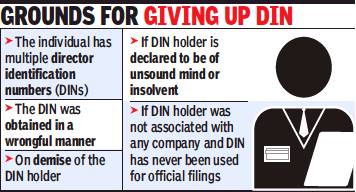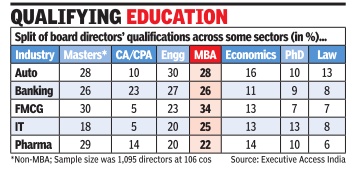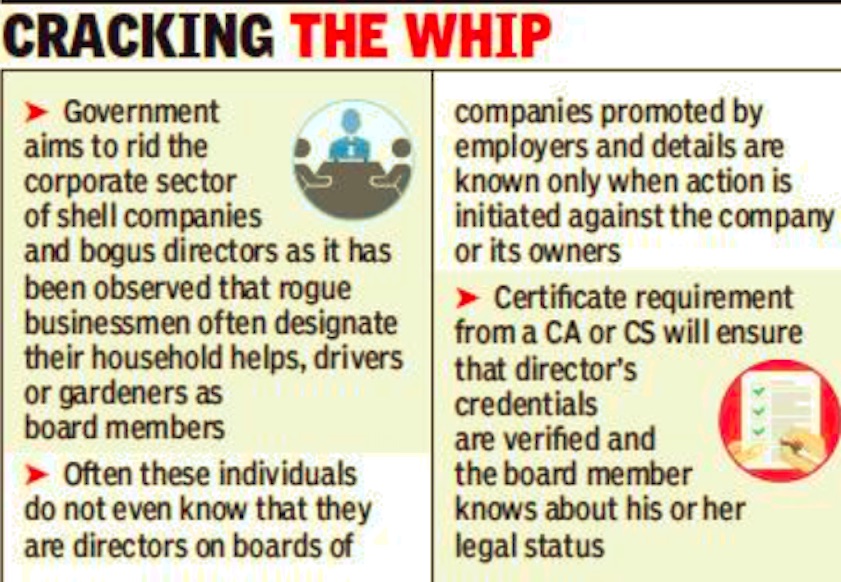Company directors: India
This is a collection of articles archived for the excellence of their content. the Facebook community, Indpaedia.com. All information used will be acknowledged in your name. |
Contents |
Age
If above 70...
Incumbent directors above 70 need 75% shareholders' nod to stay: HC The Times of India, Feb 19 2016
Reeba Zachariah & Boby Kurian India Inc's septuage narian leaders have to clear another hurdle to continue in corporate boardrooms. The Bombay high court, in a recent order, has ruled that incumben directors who are 70 years old and above will face automatic disqualification if they are no elected by a special resolution and supported by three-fourths of the shareholders. The order, by justices V M Kanade and Shalini Phansal kar-Joshi, with regard to Srid har Sundarajan vs Ultramari ne & Pigments, stated that a person who was appointed MD before April 1, 2014, when he was below 70, can continue to be on the board after turning 70 only if the company passes a special resolution to that effect. The ruling has created a flutter in corporate boardrooms with companies examining its implications.
About 100 directors, aged 70 to 73, will now be forced to seek reappointment through a special resolution. Moreover, in an era of growing shareholder activism, it may not be easy to secure an approval for directors of companies where promoter holdings are low .
The court order follows the new Companies Act that prescribes that board members, including chairman and directors, who have attained 70 years, will have to be elected by a special resolution and with 75% shareholder approval. The rule, which came into force on April 1, 2014, lacked clarity whether it impacted the tenures of those already elected.
“The order makes it clear that the rule is applicable prospectively ,“ said Viral Shukla, lawyer at Shukla & Associates.
Some of the well-known senior executives who will be im pacted include N Srinivasan (71), VC & MD, India Cements; Pracheta Majumdar (71), director, Birla Corp; Jawahar Lal Oswal (72), CMD, Monte Carlo; and Suneel Advani, CMD, Blue Star Infotech.
“We are examining the or der. We are in the process of obtaining legal opinion,“ said an India Cements spokesperson.
The rationale behind the approval through special resolutions is to have younger board members, but at the same time have experienced heads provided a majority of the shareholders feel that such people can add value to the company .
“The regulators -MCA and Sebi -should immediately put out a clarification on the Companies Act, and hold companies responsible for noncompliance. Companies have chosen to ignore this nuance of directors' age limit. Minority shareholders' interest and rights cannot be taken for granted,“ said Shriram Subramanian, MD, InGovern Research, a proxy advisory firm.
Director identification number (DIN)
Surrendering DIN is almost impossible/ 2018
Lubna Kably, Tough for directors to give up ID no.s, September 22, 2018: The Times of India

From: Lubna Kably, Tough for directors to give up ID no.s, September 22, 2018: The Times of India
‘DIN’ Deactivation Only Way Out, Experts Seek Govt Nod For Voluntary Surrender
Once you have obtained a director identification number (DIN), it sticks to you like a shadow and — barring limited circumstances — you cannot voluntarily surrender it. Several corporate law experts hold that former directors, who have no wish to continue on other boards, should be allowed to surrender their DIN. Ongoing compliance is especially challenging for erstwhile foreign directors.
A recent news item that the government has decided to deactivate the DINs of as many as 21 lakh directors was followed by a frenzy of messages on social media groups. The reason? After September 15, which was initially set as the last day for the KYC compliance, several top political leaders and a few Bollywood superstars had their DIN deactivated. TOI verified this and also noted that these individuals were no longer directors on the board of any company, including those once promoted by them.
A few days later, the government gave defaulting directors another chance — KYC details can now be filed by October 5, with a fee of Rs 500 (reduced from Rs 5,000). According to industry watchers, this extension may get a lukewarm response.
Rule 11 of the Companies (Appointment and Qualification of Directors) Rules, 2014, is restrictive when it comes to surrender of a DIN (see graphic). J Sundharesan, founder of a firm of practising company secretaries, points out, “As regards voluntary surrender, a DIN holder can do so only if he/she has never been associated as a director in any company and the said DIN has never been used for filing of any document with any authority.” But such instances are rare, and holding a DIN comes with its annual KYC filing obligations and intimation of any change in particulars such as address.
“Some individuals may have obtained a DIN in specific circumstances which no longer apply, such as acting as a first director to facilitate company incorporation. Or by a foreign national on secondment as an MD to India for a limited duration, who may now have moved on, or by a director of a company which has been liquidated. Even if these individuals have no intention to act as directors in other Indian companies, under current law they all still need to make filings and maintain their DINs,” explains Bharat Varadachari, partner and national leader (global compliance) at EY India.
While the annual form is to be e-filed, both Varadachari and Sundharesan say that erstwhile foreign directors face greater compliance challenges, such as notarisation of identification documents.
“If an individual chooses not to be a director, he/ she should have the ability to surrender DIN and all formalities that go alongside. Perhaps here a distinction should be made in regards to executive and non-executive directors. Of course, DIN records would exist to take care of past activities,” says Simone Reis, leader (M&A) at law firm Nishith Desai Associations.
But there are practical issues. “Once DIN is surrendered, the corporate affairs ministry’s database may show no past association with any companies and stakeholders like creditors, shareholders, foreign investors, various authorities will face challenges in identifying directors in companies where noncompliance or frauds have occurred. An option like keeping the DIN dormant or inactive for filing can be considered,” suggests Vedashri Bhilare, partner at GHV & Co, a firm of practising company secretaries.
On the flip side, Shankar Jaganathan, CEO at Cimply-Five Secretarial Services, does not view the inability to surrender as a material issue. Holding a DIN does not prevent anyone from undertaking other roles, is his take.
Educational qualifications
2017
Namrata Singh, Over 25% of India Inc's directors have an MBA, June 26, 2017: The Times of India

Given the popularity of an MBA degree in India, an MBAMBA-equivalent is the most commonly held qualification among directors on boards of companies. A study by executive search firm Executive Access India -done exclusively for TOI -says more than a quarter (26%) of directors, on an average, hold an MBAMBAequivalent degree, followed by a non-MBA master's degree (22%). An engineering degree comes in third with only a fifth of board members holding such an educational qualification.
In terms of subjects of specialisation, economics stood out with around 10% having either a graduate or higher degree in the subject. In what reflects poorly on diversity on boards, nearly half the directors (47%) across industries were specialists in their respective fields. Retail and financial services have close to 67% of directors with significant experience within their respective industries.
While most corporate boards are seen to be taking measures to move the needle with respect to gender diversity , the Executive Access study covering 1,095 directors across 106 companies from across industries reveals a lack of general diversity on boards with respect to education, age and region. Auto industry had the highest composition of engineering graduates (30%) as directors, while in FMCG, 34% directors had MBA degrees. In banking, chartered accountants (CAs) held almost 30% of board positions.
Retail saw the lowest percentage (11%) in master's degree (not including the MBA), while it was the highest for the MBAMBA-equivalent (38%), indicating a strong preference for MBAs on the boards of these companies. Hotels, on the other hand, saw the lowest MBA degree holders (14%), engineering degree holders (6%) and PhD holders (2%).
Ronesh Puri, MD, Executive Access India, said, “Moving towards diverse boards is the next stage of evolution for organisations as they face bigger challenges of disruptions going for ward. Boards need to help the management to innovate more and faster as shelf life of any product or service is reducing fast. For ensuring this, boards will get better outcomes when they have more diversity of backgrounds and mindsets.“
Among companies with greater board diversity , Dr Reddy's Laboratories (DRL) had the highest representation of people from different industry backgrounds. As against the industry average of 35% of board directors with non-pharma background, DRL has 60%. Bajaj Finserv has a mix of 80% directors from the non-finance space while the industry average is at 35%. ICICI Prudential's board is composed of 42% engineers while the industry average is only 15%.
As against the FMCG industry average of 5% CA directors, Nestle has almost 30% of CAs on its board. A Nestle In dia spokesperson said the company's policy is to have broad experience and diversity on the board of directors, which embraces knowledge and understanding of relevant diverse geographies, people and their background, diverse culture, personality and work-style.
Rajeev Dubey , group president (HR & corporate services), Mahindra Group, said, “There are many dimensions of board diversity and education mix is just one of them. The other dimensions could be business experience, functional expertise, age, gender and nationality .“
Other requirements/ qualifications mandated by govt.
2018 norms
Directors need to give KYC details to remain on board, July 12, 2018: The Times of India

From: Directors need to give KYC details to remain on board, July 12, 2018: The Times of India
PAN-Linked E-Signatures, Certificate From CA/CS Required
The 30-35 lakh “active directors” on company boards will have to submit PANauthenticated digital signatures and a certificate from a chartered accountant or a company secretary to remain on boards as part of a massive KYC exercise undertaken by the government to ensure that only genuine individuals are responsible for running the affairs of companies.
The ministry of corporate affairs has ordered that it will be conducting the KYC exercise with all the 50 lakh individuals holding DINs, or director identification numbers, being asked to fill up an electronic form by August 31. Those who do not submit the form will see their DINs deactivated. The exercise covers all DINs issued up to March 31, 2018.
The details of KYC, such as digital signature and certification by a chartered accountant or a company secretary, will be specified shortly as the government is invoking a legal provision to ask two professional institutes — ICAI and ICSI — to help in the “national cause” to clean up businesses.
The plan for KYC is part of the government’s drive to rid the corporate sector of shell companies and bogus directors as it has seen that rogue businessmen often designate their household helps, drivers or gardeners as board members. Most of the times, these individuals do not even know that they are directors on boards of companies promoted by their employers and details come to light only when action is initiated against the company or its owners. “The exercise will help clean up the sector, at least from now on,” said an official.
While the original plan was to go for an Aadhaar-linked authentication, the move had to be shelved in the wake of the ongoing case in the Supreme Court. PAN-authenticated digital signatures will also serve the purpose, explained government officials. PAN in the digital signature will be matched with the income tax department’s database to ensure that bogus directors are weeded out. Besides, most of the PANs are linked to Aadhaar, providing further comfort.
In addition, requirement for a certificate from a CA or CS will also ensure that the director’s credentials are verified and the board member knows about his or her legal status.
The norms would be applicable to Indian as well as foreign directors on the boards of Indian companies.
Removal of independent directors
2018: second term directors’ removal
Tough norms for removing second term ind directors, February 23, 2018: The Times of India
Independent directors appointed for a second term at corporates can now be removed only by a special resolution passed by shareholders, with the government tightening the rules for the same. Before removal, such independent directors should also be given “reasonable opportunity of being heard”, according to the corporate affairs ministry.